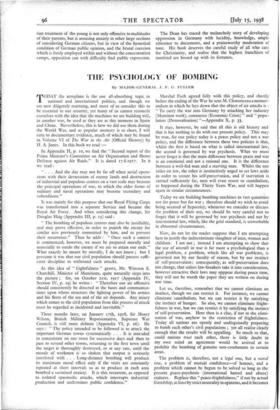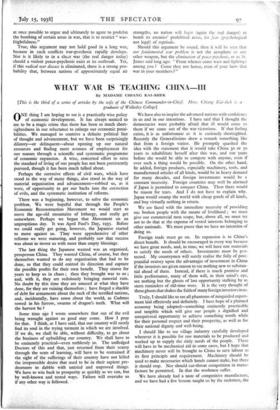THE PSYCHOLOGY OF BOMBING
By MAJOR-GENERAL J. F. C. FULLER.
TODAY the aeroplane is the one all-absorbing topic in national and international politics, and though we are now diligently rearming, and most of us consider this to be essential to our security, yet many of us cannot reconcile ourselves with the idea that the machines we are building will, in another war, be used as they are at this moment in Spain and China. Nevertheless, this is how we did use them during the World War, and as popular memory is so short, I will turn to documentary evidence, much of which may be found in Volume VI of The War in the Air (Official History) by H. A. Jones. In this book we read :- In Appendix II, p. 1o, we find the " Second report of the Prime Minister's Committee on Air Organisation and Home Defence against Air Raids." It is dated 17.8.1917. In it we read :
C
. . . And the day may not be far off when aerial opera- tions with their devastation of enemy lands and destruction of industrial and populous centres on a vast scale may become the principal operations of war, to which the older forms of military and naval operations may become secondary and subordinate."
It was mainly for this purpose that our Royal Flying Corps was transformed into a separate Service and became the Royal Air Force. And when considering this change, Sir Douglas Haig (Appendix III, p. 15) said : " The bombing of populous centres may also be justifiable, and may prove effective, in order to punish the enemy for similar acts previously committed by him, and to prevent their recurrence." Then he adds : " Once such a contest is commenced, however, we must be prepared morally and materially to outdo the enemy if we are to attain our ends." What exactly he meant by morally, I do not know ; but I presume it was that our civil population should possess suffi- cient discipline to withstand such attacks.
As this idea of " frightfulness " grows, Mr. Winston S. Churchill, Minister of Munitions, quite naturally steps into the picture ; for, on October 21st, 1917 (Appendix IV, Section IV, p. 19) he writes : " Therefore our air offensive should consistently be directed at the bases and communica- tions upon whose structure the fighting power of his armies and his fleets of the sea and of the air depends. Any injury which comes to the civil population from this process of attack must be regarded as incidental and inevitable."
Three months later, on January i7th, 1918, Sir Henry Wilson, British Military Representative, Supreme War Council, is still more definite (Appendix VI, p. 26). He says : " The policy intended to be followed is to attack the important German towns systematically . . . It is intended to concentrate on one town for successive days and then to pass to several other towns, returning to the first town until the target is thoroughly destroyed, or at any rate, until the morale of workmen is so shaken that output is seriously interfered with . . . Long-distance bombing will produce its maximum moral effect only if the visits are constantly repeated at short intervals so as to produce in each area bombed a sustained anxiety. It is this recurrent, as opposed to isolated spasmodic attacks, which interrupts industrial production and undermines public confidence." Marshal Foch agreed fully with this policy, and shortly before the ending of the War he sent M. Clemenceau a memor- andum' in which he lays down that the object of air attacks is : " To carry the war into Germany by attacking her industry (Munition work), commerce (Economic Crisis) " and " popu- lation (Demoralisation) "—Appendix X, p. 33.
It may, however, be said that all this is old history and that it has nothing to do with our present policy. This may be true, for our policy today is a peace policy and not a war policy, and the difference between these two policies is that, whilst the first is based on what is called international law, the second is governed by war psychosis. What we must never forget is that the main difference between peace and war is an emotional and not a rational one. It is the difference between a well-fed man and a starving man. Whilst the one relies on law, the other is instinctively urged to set laws aside in order to secure his self-preservation, and if starvation is carried sufficiently far, men will even resort to cannibalism, as happened during the Thirty Years War, and will happen again in similar circumstances.
Today we are building bombing machines in vast quantities not for peace but for war ; therefore should we wish to avoid being accused of hypocrisy, whenever we consider or discuss the problem of their use, we should be very careful not to forget that it will be governed by war psychosis and not by international law, which, like the gold standard, is unworkable in abnormal circumstances.
Now, do not let the reader suppose that I am attempting here to justify the indiscriminate slaughter of men, women and children. I am not ; instead I am attempting to show that the use of aircraft in war is far more a psychological than a legal problem, a problem, which like all war problems, is governed not by our faculty of reason, but by our instinct of self-preservation; consequently, as self-preservation does not change, that unless law-breakers take it into consideration, however attractive their laws may apppear during peace time, they will not be worth the paper they are written on during war time.
Let us, therefore, remember that we cannot eliminate an instinct, though we can restrict it. For instance, we cannot eliminate cannibalism, but we can restrict it by satisfying the instinct of hunger. So also, we cannot eliminate fright- fulness in war, but we can restrict it by satisfying the instinct of self-preservation. Here then is a clue, if not to the elimi- nation of war, anyhow to the restriction of frightfulness. Today all nations are openly and undisguisedly preparing to bomb each other's civil populations ; yet all realise clearly enough that the results will be appalling. So much so that, could nations trust each other, there is little doubt in my own mind an agreement would be arrived at to prohibit the bombing of genuine non-combatants in- certain areas.
The problem is therefore, not a legal one, but a moral one, a problem of mutual confidence—of honour, and a problem which cannot be begun to be solved so long as the present peace-psychosis (international hatred and abuse) endures. Replace this " peace-frightfulness," if not by actual friendship, at least by strict neutrality in opinions, and it becomes at once possible to argue and ultimately to agree to prohibit the bombing of certain areas in war, that is to restrict " war- frightfulness."
True, this argument may not hold good in a long war, because in such conflicts war-psychosis rapidly develops. Nor is it likely to in a shGrt war (the real danger today) should a violent peace-psychosis exist at its outbreak. Yet, if this radical war disease is eliminated, there is a strong pro- bability that, between nations of approximately equal air strengths, no nation will begin (again the real danger) to bomb its enemies' prohibited areas, for fear (psychological not legal) of reprisals.
Should this argument be sound, then it will be seen that our fundamental war problem is not the aeroplane or any other weapon, but the elimination of peace-psychosis, or as St. James said long ago: " From whence come wars and fightings among you ? Come they not hence, even of your lusts that war in your members?"











































 Previous page
Previous page